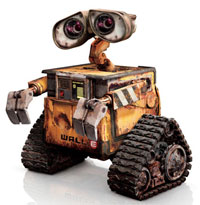Every year Chris Brogan comes up with three words as his “guiding pillars” for what to focus on in the coming year.
“Instead of resolutions, which don’t usually help me very much, I work hard on using these words as a lighthouse for my actions and efforts.”
I like that. I’ve never been one for resolutions because… well, because I lack resolve. But his post prompted me to pick three words to guide me in the coming year.
Presence. To be fully present, “in the now” as the new-agers say. I’ve been working on this for a while and it’s easily the most challenging thing I have undertaken.
Silence. Somewhere there’s a post in which I fantasize about going 24 hours without speaking. No, I have not accomplished that. Yet. Frequent reviews of Scott Adams’ Wiki Ignorance Test is helping. This is a tough one because it has much to do with ego and the need to be noticed.
Paperless. This one is actually within striking distance. I have a couple of junk-filled drawers at work the contents of which I plan to scan/discard. Eliminating paper is part of a larger –less tangible goal– of having few ‘things’ in my life.
UPDATE: I spent a couple of hours at the office getting rid of paper. Hauled 2 or 3 boxes to the dumpster. All that’s left are some archival docs and I’ll get those scanned and up on Google Docs tomorrow. I’ll keep a pad of post-it notes but the beloved yellow legal pads went back to the supply closet.
While tossing, I found a quaint list of “silent interrupters” (from Entrepreneur Magazine – August 1989):
- Multiple calendars – keep all activities recorded in one calendar system
- Open fils are a distraction. Keep them closed.
- Phone messages and reminders – scraps of paper strewn on a desk are easily lost. Use a “To Do” list.
- Business cards should be alphabetized and filed
- “Someday” files should not be in sight
- Reading matter should be filed in one place and read at a specific time.
- In-box material should be reviewed daily and the contents thrown out, delegated, filed or acted upon. Keep the box out of sight.
- Reference books should be organized and out of sight.
- Multiple card files should be consolidated into one file. Input frequently called numbers into memory phones or a reference book/box.
- Pens, staplers, and tape dispensers should be in a drawer and out of sight.
Once I’ve convinced myself I can eliminate paper from my work office, I’ll tackle the files at home.
 My human machine is 63 years old today. Like the Mars Rover, it’s holding up very well and making all sorts of discoveries, large and small.
My human machine is 63 years old today. Like the Mars Rover, it’s holding up very well and making all sorts of discoveries, large and small.